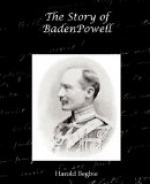He was the life of the school in those entertainments for which Charterhouse has always been famous, and his reputation as a wit followed him from the stage into the playground. B.-P. was a keen footballer, and whenever he kept goal there was always a knot of grinning boys round the posts listening with huge delight to their hero’s facetiae. He also had the habit, such were his animal spirits, of giving the most nerve-fluttering war-whoop imaginable when rushing the ball forward, and this cry is said to have been of so terrifying a nature as to fling the opposing side into a state of fear not very far removed from absolute panic. By the way, it is interesting in the light of after-events to read in the school’s Football Annual (1876, p. 30) that “R.S.S. B.-P. is a good goalkeeper, keeping cool, and always to be depended upon.”
But it was not only at football that Baden-Powell spent his time in the playground, although it was only in football that he shone. Into every game he threw himself with zest and earnestness, playing hard for his side, and finding himself always regarded by his opponents as an enemy to be treated with respect. That he continued to play cricket, racquets, and fives, although not a great success, is characteristic of his devotion to sports, and his habit of doing what is the right thing to do. Then he was a faithful and lively contributor to the school magazine, added his lusty young voice to the chapel choir, and was for ever seeking out excuses for getting up theatricals. Of one of his performances at the end of the Long Quarter in 1872 it is interesting to note that the Era of that time remarked that it was “full of vivacity and mischief.” He was always a great success as an old woman, and we shall see that in later days he played a woman’s part with huge success in far Afghanistan. At one of these school entertainments big brother Warington was present, and he laughingly recalls how the vast audience of shiny-faced boys broke into a great roar of delight directly B.-P. appeared in the wings—before he had uttered a word or made a grimace. Dr. Haig-Brown and the other masters who remember B.-P. like to recall scenes of this kind, and it is no disparagement of Ste’s other sterling qualities that they seem to have been more impressed by his excellent fooling than by any other of his good qualities. It is the greater tribute to his genius for acting.
[Illustration: Rev. William Haig-Brown, LL.D.
Lombardi & Co., Photographers,
27, Sloane Street, S.W.]
So long as the world lasts, I suppose, the intelligent boy who works hard at school will play the clown’s part in popular fiction. Tom Sawyer is the kind of youth we like to see given the chief part in a novel, while George Washington, we are all agreed, is fit target for our lofty scorn. But how few of the people we love to read about in the airy realm of fiction, or the still airier realm of history, really possess our hearts? Think over the heroes in novels who would be drawn in with both hands to the fireside did they step out from between covers and present themselves at our front door in flesh as solid as the oak itself. And the good boy in fiction is anathema. Shakespeare himself believed that




